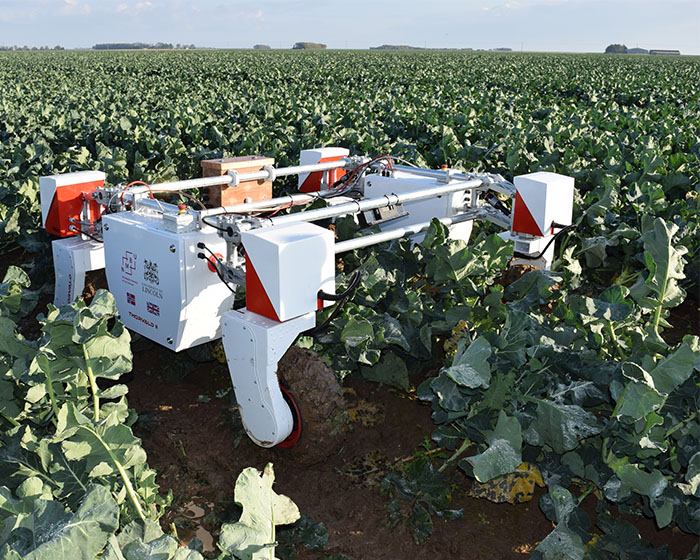/prod01/university-of-lincoln-cdn-pxl/media/responsive2017/research/Soil,Water,and,Crop,Science.jpg )
Soil, Water, and Crop Science
Our Research
Soil and water sciences at Lincoln Institute for Agri-Food Technology focus around the study of agricultural field drainage, and soil management. Our research aims to support farmers, landowners, and ecosystem managers in developing effective, sustainable approaches to land and water management.
Research Projects
HiRes-Soils: Robotic platforms for high resolution maps of soil carbon and GHG emissions
HiRes-Soil aims to massively increase the current capacity to map and understand the active part of the soil carbon cycle and NO2 emissions. It will do this by developing a field capable autonomous platform to map soil carbon flux, NO2 soil emissions, and soil cores for lab analysis. This would lead to cost effective and widespread direct measurement of soil carbon, the flux of GHGs CO2 and NO2 out of the soil, enabling carbon credits (private or government backed) to be directly audited, and land managers to learn what management practices increase carbon storage and reduced GHG soil emissions on their land.
Project Lead: Dr Shaun Coutts
Co-Investigator: Iain Gould
Funder: Innovate UK
21EJP SOIL: Preadapting soil biology for increased tolerance to elevated salinities due to climate change
This work aims to understand the science behind changed soil salinity to inform management solutions and help to maintain food supply in the face of climate change.
Project Lead: Professor Matthew Goddard
Co-Investigator: Iain Gould
Funder: Biotechnology and Biological Sciences Research Council
Developing practical guidance and evidence of sustainable practices, working towards a net-zero potato supply chain – TuberNetZero
The aim is to investigate and quantify the effect that different cropping techniques have on soil greenhouse gas (GHG) emissions to produce net zero carbon potatoes.
Project Lead: Dr Sandra Varga
Co-Investigator: Iain Gould
Funder: Innovate UK
Optimising Miscanthus Establishment through improved mechanisation and data capture to meet Net Zero targets (OMENZ)
Terravesta, a world leading expert on Miscanthus with a consortium of academic and industrial partners, aims to improve our existing technology to deliver Miscanthus planting at a scale not achievable with current approaches.
Project Lead: Professor Simon Pearson
Co-Investigators: Iain Gould, Oorbessy Gaju, Shaun Coutts, Leonidas Rempelos
Funder: Department for Business, Energy and Industrial Strategy
The economic consequences of saline groundwater flooding in Lincolnshire
This proposal will: (1) identify the type of salinisation process across the county and effect of climate change; (2) quantify the degree, length and severity of salinity and effect of climate change, (3) assess the types (and value) of crops grown; (4) estimate the loss of yield (and value) from salinisation for Lincolnshire crops and (5) assess farm level decisions/choices such as the use of salt tolerant crops and other adaptation mechanisms. Answering these questions will enable a comprehensive evaluation of the economic impact of salinity.
Project Lead: Dr Daniel Magnone
Co-Investigators: Eric Ruto, Iain Gould, Jay Emery, Mark Schuerch, Matthew Hannaford
Funder: Lincolnshire County Council
Decarbonising agriculture: synergistic nitrogen-fixing bacteria and photocatalyst to maximize fertilizer efficiency and improve air quality
This project will upscale the material manufacturing process (target capacity: 15 tons to cover 15,000 hectares of crop land) to meet the requirement for commercial application of R-Leaf to achieve and optimise the expected benefits and impacts. R-Leaf can capture atmospheric NOx and convert it into nitrate directly on crop-foliage to improve crop-growth and yield. The project aims to optimise the recommendation of the solution for a maximum output through efficacy testing, develop quality control measures for consistency of production, quantify the impact of the technology, and reflect the carbon credit value potential to support adoption.
Project Lead: Dr Taghread Hudaib
Co-Investigators: Iain Gould, Ravi Valluru
Funder: Innovate UK
Research Themes
Contact Us
Lincoln Institute for Agri-Food Technology
University of Lincoln
Riseholme Park
Lincoln
LN2 2LG







